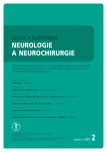Anti-NMDAR Encephalitis in Children – a Case Report
Authors:
P. Mikolášek 1; Š. Aulická 2; L. Homola 1; J. Štěrba 3; J. Bednářová 4; L. Krbková 1
Authors‘ workplace:
LF MU a FN Brno
Klinika dětských infekčních nemocí
1; LF MU a FN Brno
Klinika dětské neurologie
2; LF MU a FN Brno
Klinika dětské onkologie
3; LF MU a FN Brno
Oddělení klinické mikrobiologie
4
Published in:
Cesk Slov Neurol N 2017; 80/113(2): 224-227
Category:
Case Report
doi:
https://doi.org/10.14735/amcsnn2017224
Overview
Autoimmune encephalitis is a rare condition of the central nervous system in children. In cases of primary involvement of the limbic system structures with corresponding clinical symptoms, we use the term limbic encephalitis. They occur as part of paraneoplastic symptoms or as autoimmune inflammation of the limbic system structures. The spectrum of non-specific symptoms can lead to misdiagnosis with improperly selected therapy and sequelae for the patient. We present a case of a 15-year-old patient with an autoimmune form of anti-N-methyl-D-aspartate receptor (anti-NMDAR) encephalitis. The primary manifestation was de novo epileptic paroxysmus with subacutely evolving and progressing qualitative impairment of consciousness. Aseptic inflammation in the cerebrospinal fluid led to a suspicion of infectious meningoencephalitis. Diagnosis of anti-NMDAR encephalitis was confirmed by the presence of antibodies in the cerebrospinal fluid and in the serum. Following acute deterioration of the condition, it was necessary to intensify therapy with corticosteroids, plasmapheresis, immunoglobulins, immunosuppressives and biological treatment. Despite complications, including impaired vital functions, the patient was cured without permanent sequelae.
Key words:
limbic encephalitis – paraneoplastic antibodies – anti-NMDAR
The authors declare they have no potential conflicts of interest concerning drugs, products, or services used in the study.
The Editorial Board declares that the manuscript met the ICMJE “uniform requirements” for biomedical papers.
Sources
1. Dalmau J, Lancaster E, Martinez-Hernandez E, et al. Clinical experience and laboratory investigations in patients with anti-NMDAR encephalitis. Lancet Neurol 2011;10(1):63 – 74. doi: 10.1016/ S1474-4422(10)70253-2.
2. Irani SR, Alexander S, Waters P, et al. Antibodies to Kv1 potassium channel-complex proteins leucine-rich, glioma inactivated 1 protein and contactin-associated protein-2 in limbic encephalitis, Morvan‘s syndrome and acquired neuromyotonia. Brain 2010;133(9):2734 – 8.
3. Krýsl D, Marusič P. Autoimunitní limbické encefalitidy. Neurol Praxi 2012;13(3):160 – 4.
4. Dalmau J, Gleichman AJ, Hughes EG, et al. Anti-NMDA-receptor encephalitis: case series and analysys of the effects of antibodies. Lancet Neurol 2008;7(12):1091 – 8. doi: 10.1016/ S1474-4422(08)70224-2.
5. Lynch DR, Anegawa NJ, Verdoorn T, et al. N-methyl-D-aspartate receptors: different subunit requirements for binding of glutamate antagonists, glycine antagonists, and channel-blocking agents. Mol Pharmacol 1994;45(3):540 – 5.
6. Coyle JT. Glutamate and schizophrenia: beyond the dopamine hypothesis. Cell Mol Neurobiol 2006;26(4 – 6):365 – 84.
7. Lau CG, Zukin RS. NMDA receptor trafficking in synaptic plasticity and neuropsychiatric disorders. Nat Rev Neurosci 2007;8(6):413 – 26.
8. Consoli A, Ronen K, An-Gourfinkel I, et al. Malignant catatonia due to anti-NMDA-receptor encephalitis in a 17-year-old girl: case report. Child Adolesc Psychiatry Ment Health 2011;5(1):15. doi: 10.1186/ 1753-2000-5-15.
9. Florance NR, Davis RL, Lam C, et al. Anti - N-methyl-D-aspartate receptor (NMDAR) encephalitis in children and adolescents. Ann Neurol 2009;66(1):11 – 8. doi: 10.1002/ ana.21756.
10. Irani SR, Bera K, Waters P, et al. N-methyl-d-aspartate antibody encephalitis: temporal progression of clinical and paraclinical observations in a predominantly non-paraneoplastic disorder of both sexes. Brain 2010;133(6):1655 – 67. doi: 10.1093/ brain/ awq113.
11. Davies G, Irani SR, Coltart C, et al. Anti-N-methyl-D-aspartate receptor antibodies: a potentially treatable cause of encephalitis in the intensive care unit. Crit Care Med 2010;38(2):679 – 82.
12. Libá Z, Hanzalová J, Sebroňová V, et al. Anti-N-metyl-D-aspartát receptorová encefalitida. Cesk Slov Neurol N 2014;77/ 110(5):624 – 30.
Labels
Paediatric neurology Neurosurgery NeurologyArticle was published in
Czech and Slovak Neurology and Neurosurgery

2017 Issue 2
-
All articles in this issue
- Ulnar Nerve
- Increased Muscle Tone in Pre-term Infants as a Sign of Neuromaturation and Options for its Assessment
- Options for Activation of Plastic and Adaptation Processes in the Central Nervous System using Physiotherapy in Multiple Sclerosis Patients
- Transcranial Magnetic Stimulation in the Research of Cortical Inhibition in Depressive Disorder and Schizophrenia, the Effect of Antipsychotics
- Toxic Effects of Pesticides
- The Role of the Cell-mediated Immunity in the Pathogenesis of Multiple Sclerosis with Focus on Th17 and Treg Lymfocytes
- Stroke Incidence in Europe – a Systematic Review
- Ocular Myasthenia Gravis in Slovak Republic
- Emotional Awareness in Adolescents – a Pilot Study of Psychometric Properties of the Czech Adaptation of the Levels of Emotional Awareness Scale for Children LEAS-C
- Fingolimod in Real Clinical Practice
- “Awake” Resection of Glioma in Semisitting – a Case Report
- Anti-NMDAR Encephalitis in Children – a Case Report
- Febrile Seizures – Guidelines for Examination of a Child with Simple Febrile Seizures, Adapted from the Guidelines of the American Academy of Pediatrics
- Guidelines for Diagnosis and Treatment of Lower Urinary Tract Symptoms in Patients with Multiple Sclerosis in the Czech Republic – Interdisciplinary Expert Consensus Using DELPHI Methodology
- Placement Accuracy of Deep Brain Stimulation Electrodes using the NexFrame© Frameless System
- Czech and Slovak Neurology and Neurosurgery
- Journal archive
- Current issue
- About the journal
Most read in this issue
- Ulnar Nerve
- Stroke Incidence in Europe – a Systematic Review
- Anti-NMDAR Encephalitis in Children – a Case Report
- Febrile Seizures – Guidelines for Examination of a Child with Simple Febrile Seizures, Adapted from the Guidelines of the American Academy of Pediatrics
